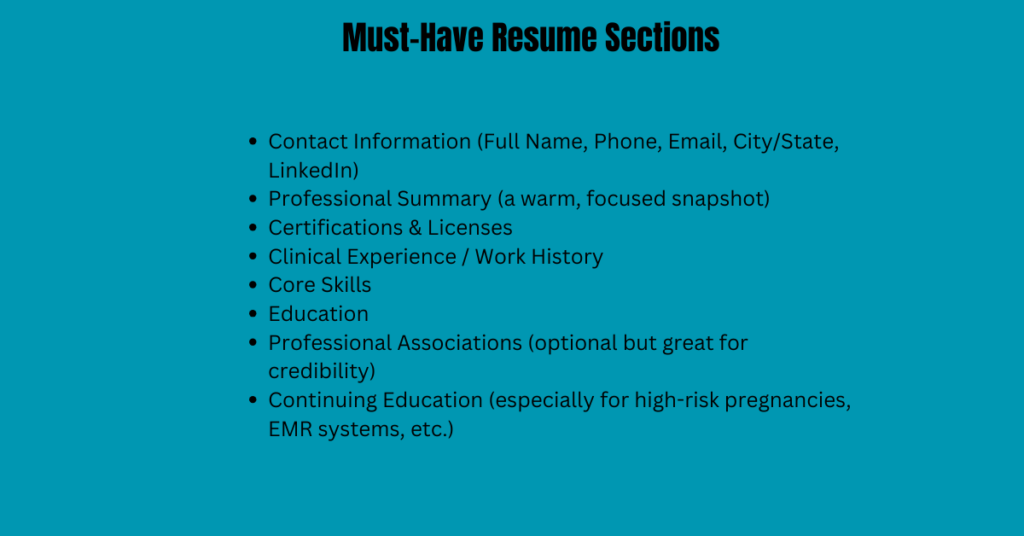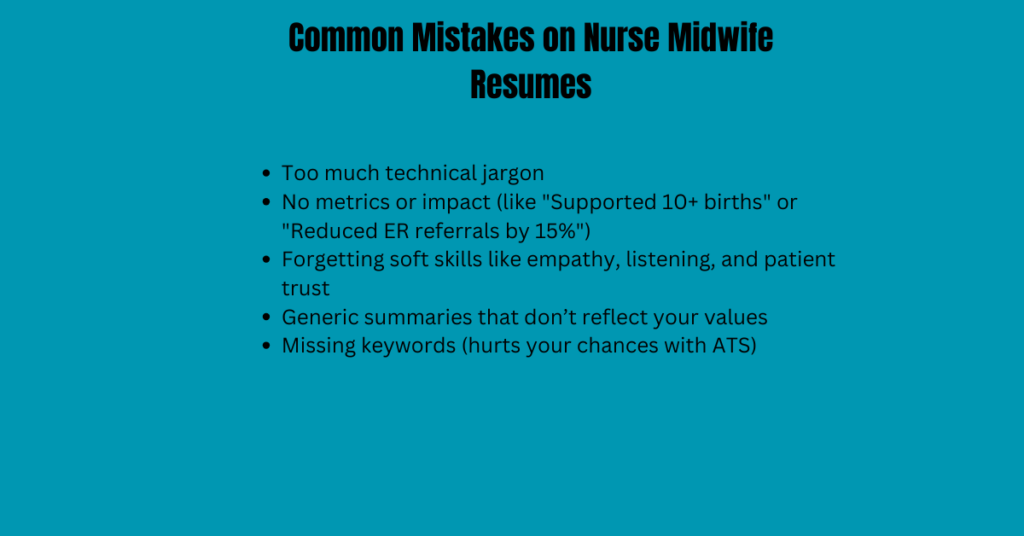I’ve worked with hundreds of aspiring midwives over the past decade. And one thing they all said?
“I don’t know what to put on my resume.”
Sound familiar?
Whether you’re fresh out of school, a seasoned nurse making the leap into midwifery, or someone who took the scenic route here — I see you. Writing a resume can feel like standing at the edge of a cliff, unsure where to step first.
Here’s the good news: you don’t need to be perfect. You just need to be real, relevant, and confident in your story. Let me walk you through how to do that, step-by-step.
Understanding the Role of a Midwife: More Than Just a Birth Partner
Being a midwife isn’t just about catching babies. It’s about showing up—fully, compassionately, and skillfully—for women at one of the most powerful, vulnerable, and transformative moments of their lives.
A midwife is a highly trained healthcare professional, yes—but also a steady hand, a calming voice, and often, a trusted presence through every stage of the pregnancy journey. From the first heartbeat heard on a monitor to those fragile, emotional first weeks at home, midwives walk beside mothers with equal parts medical expertise and human empathy.
More Than Prenatal Appointments—It’s Connection and Trust
During pregnancy, a midwife doesn’t just check vitals or measure a baby bump. They take time to listen—to answer questions, ease fears, and help expectant mothers understand what’s happening in their bodies. They discuss birthing plans, talk through options, and make sure each woman feels informed and in control of her own experience. That trust is sacred.
Midwives help mothers navigate everything from morning sickness and mood swings to tough decisions about pain relief or birthing environments. And in doing so, they help build the confidence many women need to step into motherhood feeling empowered.
Support Through Labor—Mind, Body, and Soul
Labor is intense. It’s raw. It’s life-changing. And in those hours, the presence of a midwife can make all the difference.
Midwives are there to monitor the health of both mother and baby, yes—but also to offer encouragement, guidance, and grounding when emotions run high. They know when to step in and when to simply hold space. Whether it’s suggesting a new position, rubbing a back, or just whispering, “You’re doing great,” their support is both clinical and deeply emotional.
And if things don’t go according to plan? A well-trained midwife is ready. Many are certified nurse-midwives (CNMs) or licensed midwives with extensive medical training in obstetrics and neonatal care. They know when to call in additional support, when to adapt the birth plan, and how to prioritize safety without sacrificing dignity.
After the Birth—Healing, Bonding, and Becoming
The role of a midwife doesn’t end with the delivery. In fact, what comes after is just as important. The postpartum period can be a whirlwind of hormones, healing, exhaustion, and joy. And a midwife is often one of the few professionals who checks in regularly during this time—asking not just about the baby, but about you, the mother.
They assist with everything from breastfeeding challenges to emotional recovery. They help spot signs of postpartum depression. They show parents how to swaddle, soothe, and understand their newborns—and in doing so, help ease the often-overwhelming transition into parenthood.
What It Takes to Be a Midwife
It takes a unique kind of person to become a midwife. You need deep knowledge of pregnancy, childbirth, and neonatal care—but also an ability to hold space for pain, joy, fear, and awe, all at once.
Most midwives are certified professionals. In the U.S., that often means earning the title of Certified Nurse-Midwife (CNM), Licensed Midwife (LM), or Certified Professional Midwife (CPM), depending on the path taken. Each of these designations requires rigorous education, clinical training, and a fierce commitment to safe, personalized care.
But the real heart of midwifery? It’s the unwavering belief that birth is not just a medical event—it’s a human one.
A Calling Rooted in Care
To put it simply, midwives change lives. They’re advocates. Educators. Healers. And sometimes, the one person in the room who truly sees and honors what a woman is going through.
They don’t just deliver babies—they deliver reassurance, strength, and trust. They are champions of informed choice, protectors of birth stories, and quiet heroes in delivery rooms across the world.
So when we talk about the role of a midwife, let’s not minimize it. Let’s recognize it for what it truly is: a calling rooted in care, led by heart, and backed by knowledge.
How Do You Write a Strong Nurse Midwife Resume?
Let’s start simple. A strong nurse midwife resume does three key things:
- Shows you’re qualified (education, certifications, licenses)
- Highlights your care-driven skills (especially labor, delivery, and prenatal care)
- Tells a story that connects emotionally with hiring managers
Now let me explain why that last one matters.
When I helped Clara, a new Certified Nurse Midwife, she kept saying, “I don’t have enough experience. I’m just a student.”
We rewrote her resume to focus on what she did have: 400+ hours of clinical rotations, assisting in 12 live births, and glowing feedback from her preceptors. She landed her first interview in 3 days.
Because hiring managers aren’t just looking for years. They’re looking for heart.
Best Resume Format for Nurse Midwives
Personally, I think a hybrid resume format works best for nurse midwives. It combines your work experience with a solid skills section — perfect if you’re new or pivoting careers.
Must-Have Resume Sections:
- Contact Information (Full Name, Phone, Email, City/State, LinkedIn)
- Professional Summary (a warm, focused snapshot)
- Certifications & Licenses
- Clinical Experience / Work History
- Core Skills
- Education
- Professional Associations (optional but great for credibility)
- Continuing Education (especially for high-risk pregnancies, EMR systems, etc.)

Example: Nurse Midwife Resume Summary (New Grad)
Compassionate Certified Nurse Midwife with 500+ hours of clinical rotations in prenatal care, labor, and delivery. Skilled in birth plan management, patient education, and evidence-based practice. Passionate about empowering women through informed and holistic care.
What Skills Should Be Highlighted in a Nurse Midwife Resume?
When we rewrote Leila’s resume, she was missing one thing: keywords.
These are words hiring managers and Applicant Tracking Systems (ATS) look for. Let’s fix that for you.
Nurse Midwife Skills to Include:
- Prenatal care experience
- Labor and delivery skills
- Birth plan counseling
- Newborn care and breastfeeding support
- Patient education and advocacy
- High-risk pregnancies
- Women’s health exams
- Electronic medical records (EMR)
- Interdisciplinary collaboration
- Compassionate care
- Midwifery clinical rotations
What Experience Should a Nurse Midwife Emphasize?
Even if you haven’t held the official job title yet, your clinical rotations, volunteer work, and shadowing experiences matter.
Example:
Clinical Midwifery Student | Boston Women’s Health Center | Jan 2023 – May 2023
- Participated in over 20 prenatal visits and 8 live births under supervision
- Developed and implemented individualized birth plans
- Educated patients on labor stages, newborn care, and postpartum recovery
- Documented patient records using Epic EMR system
Do Nurse Midwives Need to Include Certifications?
Yes. Absolutely. No question.
Key Certifications:
- Certified Nurse Midwife (CNM)
- RN License (state-specific)
- Basic Life Support (BLS)
- Neonatal Resuscitation Program (NRP)
- Advanced Cardiac Life Support (ACLS)
- Any state-specific midwife licensing (as required)
Pro tip: Add expiration dates and certifying organizations.
What Makes a Nurse Midwife Resume Stand Out?
It’s not just the qualifications. It’s how you make someone feel reading it.
When I helped Marcus update his resume, he was unsure if his previous work in a family clinic mattered. But we framed it around what did matter:
- His patient education sessions
- His gentle bedside manner
- His ability to stay calm during emergencies
That’s how you stand out. You lean into the human side of healthcare.
Common Mistakes on Nurse Midwife Resumes (And How to Avoid Them)
- Too much technical jargon
- No metrics or impact (like “Supported 10+ births” or “Reduced ER referrals by 15%”)
- Forgetting soft skills like empathy, listening, and patient trust
- Generic summaries that don’t reflect your values
- Missing keywords (hurts your chances with ATS)

Real-World Example: Jenna’s Transformation
Jenna was a career changer. Former high school biology teacher. She worried no one would take her seriously.
So we highlighted:
- Her communication and teaching skills
- Her accelerated nursing program
- Her capstone rotation in OB-GYN
We even pulled a quote from a patient satisfaction card she received.
Jenna got two interviews within a week. Because we didn’t hide her past. We reframed it.
Resume Objectives for Midwives (If You’re Just Starting Out)
Driven midwifery graduate with strong clinical training in prenatal and postpartum care. Excited to join a collaborative team providing evidence-based and compassionate obstetric care. Seeking to support women through safe, informed, and empowering birth experiences.
Professional Associations to Include:
- American College of Nurse-Midwives (ACNM)
- Midwives Alliance of North America (MANA)
- Your State Board of Nursing
👶🏽 Applying for a Specialized Nursing Role?
Whether you’re targeting a career in the NICU or aiming to make an impact as a Public Health Nurse, your resume needs to reflect your unique strengths. Check out our NICU Nurse resume sample with key skills and discover How to write a standout resume for Public Health Nurse roles. These tips will help you showcase your expertise and get noticed!
FAQs
Q: How do you write a strong nurse midwife resume?
A: Use a clean format, include your certifications, highlight clinical experience, and focus on both technical and emotional skills like patient care and communication.
Q: What skills should be highlighted in a nurse midwife resume?
A: Labor support, prenatal care, EMR documentation, evidence-based practice, and compassionate care.
Q: Do nurse midwives need to include certifications on their resume?
A: Yes. Always. Include CNM, RN License, BLS, NRP, ACLS, and any state-specific midwife licenses.
Final Words from a Coach Who Cares
Look, I know writing your resume can feel overwhelming. But you don’t have to do it perfectly. You just have to do it honestly.
Because the truth is, you’re not just applying for a job. You’re stepping into a calling.
Want a head start? Try our free Nurse Midwife Resume Builder . It’s clean and watermark free.




Pingback: Military to Civilian Nurse Resume Guide - Best Resume Creator